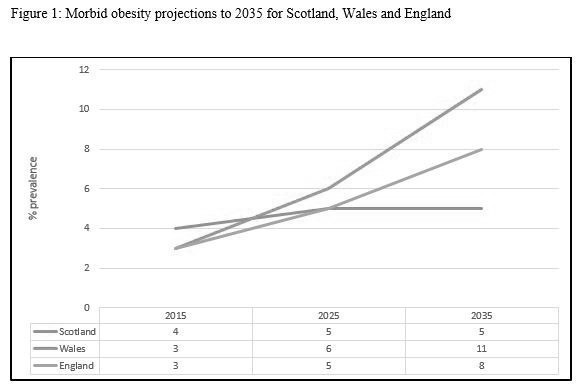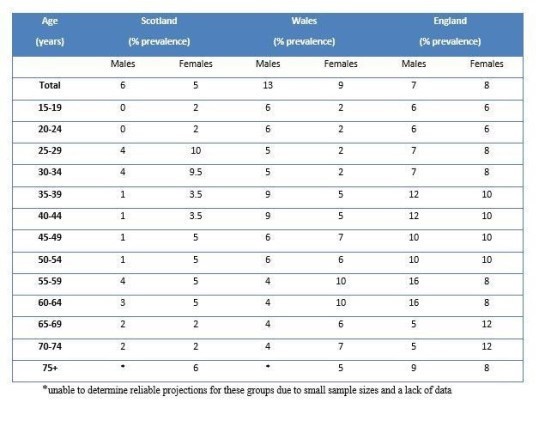By Professor John Robertson
As the Guardian headlines UK children shorter, fatter and sicker amid poor diet and poverty, report finds based on a Food Foundation report explicitly titled A NEGLECTED GENERATION: Reversing the decline in children’s health in England, I’ve struggled to access the full data or to directly comparable Scottish data from the same period.
However in December 2022, only 18 months ago, I had:
Dramatic fall in number of children at risk of obesity
In just one year after the effects of the pandemic in increasing the risk, NHS Scotland and Government programmes, schools and children themselves have produced a sharp improvement in the number of children at risk of obesity.
The graph suggests that further improvement can be expected in 2022/23.
I’m not up-to-date on figures for a bit of whitabootery of the kind our MSM loves and hates depending on whether it’s bad for the SNP or not, but in 2020, we had this:
What is the SNP Government doing to reduce obesity? You don’t know? You’re not really that interested? Oh, maybe that Prof Robertson will know? Let’s see:

Research from the London School of Hygiene and Tropical Medicine, reported in the Independent on 26th May 2018 suggested:
‘Under current trends it is predicted that 11 per cent of the population in Wales will be morbidly obese in 2035, roughly 340,000 adults, while Scotland is likely to plateau at about 5 per cent and England will rise to about 8 per cent.’
The researchers offer a surprisingly clear, confident and simple explanation, for the significantly slower growth in Scotland – Scottish Government policy initiatives and resource allocation:
‘The government put a massive push on developing a route map for how we can actually combat this. They put together resources from the NHS that were proving to be effective. They did put a lot of work into it.’
Advertisement
Privacy Settings
I appreciate that the trend graph relates to combined male and female obesity, but the table below shows that for other than two groups, the prevalence of obesity in Scottish women is expected to be significantly lower than that in England or Wales and notably much lower for the 15-24-year-olds most likely to have experienced, in schools and colleges, the ‘Scottish Government policy initiatives and resource allocation.’

Table: Predicted % prevalence of obesity
https://www.eveningexpress.co.uk/news/five-million-british-people-will-be-morbidly-obese-by-2035-study-shows-2/
Also, published in November 2018, but ignored again by the Nomedia, later research findings supported the London School findings:
From Growing Up in Scotland: Overweight and Obesity at Age 10:
‘Historic data from the survey shows that the prevalence of overweight [in Scotland] including obesity remained relatively stable between 1998 and 2016, fluctuating between 28% and 33%. However, in recent years levels of obesity have shown a steady decline dropping from 17% in 2014. This is largely due to a decline in obesity amongst boys which have dropped from 20% in 2012 to 12% in 2017 [40%].’ (14)
‘The results are broadly comparable with similar UK research. For example, analysis of data from the Millennium Cohort Study showed that the proportion of healthy, overweight and obese 5-year olds becoming or remaining obese by age 11 were 6%, 32% and 68% respectively (Mead et al, 2016). Comparative figures from analysis of administrative data from the National Child Measurement Programme (NCMP)13 in England were 8%, 43% and 77% (Copley et al, 2017).’ (25)
So, compared to England, 25% fewer healthy 5-year-olds becoming obese by 11 in Scotland. Similarly, 25% fewer overweight 5-year-olds becoming obese and 12% fewer obese 5-year-olds remaining obese.
While the London School research directly attributes credit to Scottish Government policy initiatives, this modestly associates them. See:
‘Food available in and around schools has also been a focus of policy aimed at improving children’s diets. Legislation5 requiring local authorities to ensure schools provide food and drink of an appropriate nutritional standard has been in place since 2007 with accompanying guidance’ (17)
‘Progress towards achieving the goal of a more active population has been made through a range of activities in recent years including the implementation of the National Walking Strategy (Scottish Government, 2014c), the Cycling Action Plan (Scottish Government, 2017b), the Active Schools programme8, Community Sports Hubs9 and the Legacy 2014 Physical Activity Fund10. Of particular relevance for children and young people is the Scottish Government’s commitment to expanding the Daily Mile11 to ensure that Scotland becomes the first ‘Daily Mile nation’ with roll out to nurseries, schools, colleges, universities and workplaces. Recent research results suggest the Daily Mile is effective at increasing levels of moderate to vigorous physical activity (MVPA), reducing sedentary time, increasing physical fitness and improving body composition.’ (17/18)
https://www.gov.scot/publications/growing-up-scotland-overweight-obesity-age-10/

Why the English hacks CONSTANTLY LIE
ARE THEY SCARED OF BEING ALONE!!!!!!!!!!!!
<
div>
<
div>
Sent from my iPhone
<
div dir=”ltr”>
<
blockquote type=”cite”>
LikeLike
Christ almighty John, can you please ask someone to figure out why inclusion of an archive article automatically consigns a comment to the bin due to your specific site settings ? I’m old, so easily forget ‘don’t do this here’, but at least I haven’t peed in the fridge yet because the light was on 😉
I’ll try to summarise what I’d already written, but it is essentially one hooray henry citing another hooray henry in a Grauniad articel blaming advertising and cheap processed food rather than highlighting Tories having reduced incomes such that even nurses and teachers have to avail of food banks.
The first hooray henry is the author of the piece, Andrew Gregory, laughably described as ‘Health editor’ which he proudly displays on his own website “Andrew Gregory is a British journalist, writer, producer, director, and photographer, and a reporter and editor at The Guardian” – The second hooray henry is indeed well obvious with that surname, “The decline in children’s health shown clearly in this report is a shocking and deeply sad result of the failures of the food system in the UK,” said Henry Dimbleby, the former government food tsar and author of the National Food Strategy.’
Neither of these two hooray henrys would blink an eye at an aperitif with avocado toast before their main meal at much the same cost as a family of five would have to conjure from what they had bought that week, yet it’s ‘feckless parents’ and advertising to blame, not the horde of elephants in the room, the malicious impoverishment of the populace to the betterment of the few who can enjoy “an aperitif with avocado toast..”.
LikeLiked by 2 people
Hi Bob
Sorry I’m on my own here with no techy assistant.
John
LikeLiked by 1 person